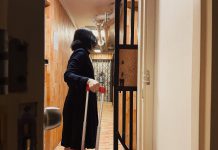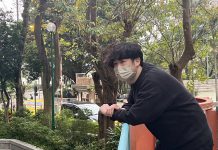Children with disabled parents gain different perspectives on life
By Marilyn Ma & Nancy Mak
On a chilly winter morning on the campus of Hong Kong Polytechnic University (PolyU), 21- year-old Mandy Wong Man-ling walks slowly beside her mother, who is using a crutch. Wong watches her mother closely, anticipating her needs and holding her tightly when she walks down a steep slope. Later, when the mother and daughter sit down to talk to Varsity, Wong puts a few pillows on the sofa before her mother sits down.
Wong is in her final year of a social work degree at PolyU and intends to become a social worker after she graduates. It is a vocation influenced by her parents, who are both disabled due to childhood polio which affected their mobility.
Wong’s mother, Jenny Tsang Lai-kwan has a more serious condition than her husband because infections of her central nervous system caused back damage and she is now mostly unable to take public transport. Tsang uses crutches most of the time and relies on taxis and rehabilitation buses to get around the city.
Luckily, her daughter has been at her side and helping her since she was small. Tsang recalls that from around the age of eight, she would take Mandy out during school holidays to develop her awareness and alertness to her needs. Whenever they took public transport, Mandy would learn how to prepare her mother to alight from the bus one stop ahead, help her get off, and be aware of locations for disabled access.
“I think I’ve been used to paying attention to others’ needs and contingencies since I was small, so I have a higher awareness of the people around us and greater willingness and motivation to work as a frontline carer,” says Wong.
Due to her disability, Tsang was unable to take the young Mandy out to many places for exploration and discovery. So she chose to spend more time with her daughter instead to make up for it. Tsang retired from her job as an assistant clerical officer in a Government department when Mandy was studying in primary three so they could have a closer relationship and more communication.
“I want her to understand more about me. In terms of the way I live, I’m different from the others,” says Tsang. “I don’t want her to feel inferior because of me.” As Tsang suffered from low self-esteem as a child, she wanted her own daughter to have a happy childhood.
Wong spends much more time with her mum than many others of her generation. They have breakfast together every morning and go to church together at the weekends. Tsang makes a point of getting to know her daughter’s classmates and friends without being afraid of letting them know about her disability. When Mandy was in secondary school, her mum would come to her school during lunchtimes and have lunch with Mandy and her friends. She wanted Mandy’s friends to know about her.
As a result, the pair has established a very close relationship. Wong likes to share everything with her mother and feels much love in her family.
“[My] parents’ disabilities are a kind of blessing, which have had a positive effect on me,” she says.







































